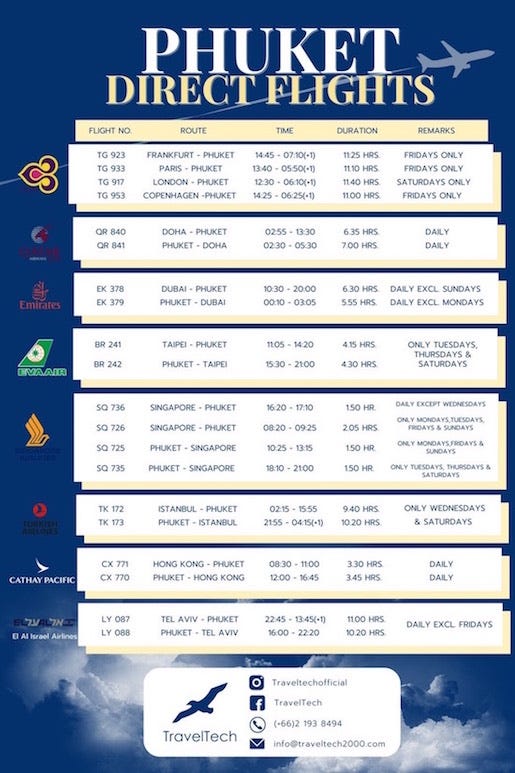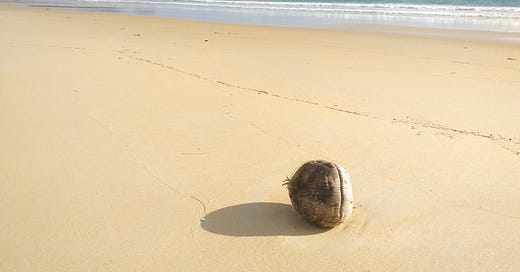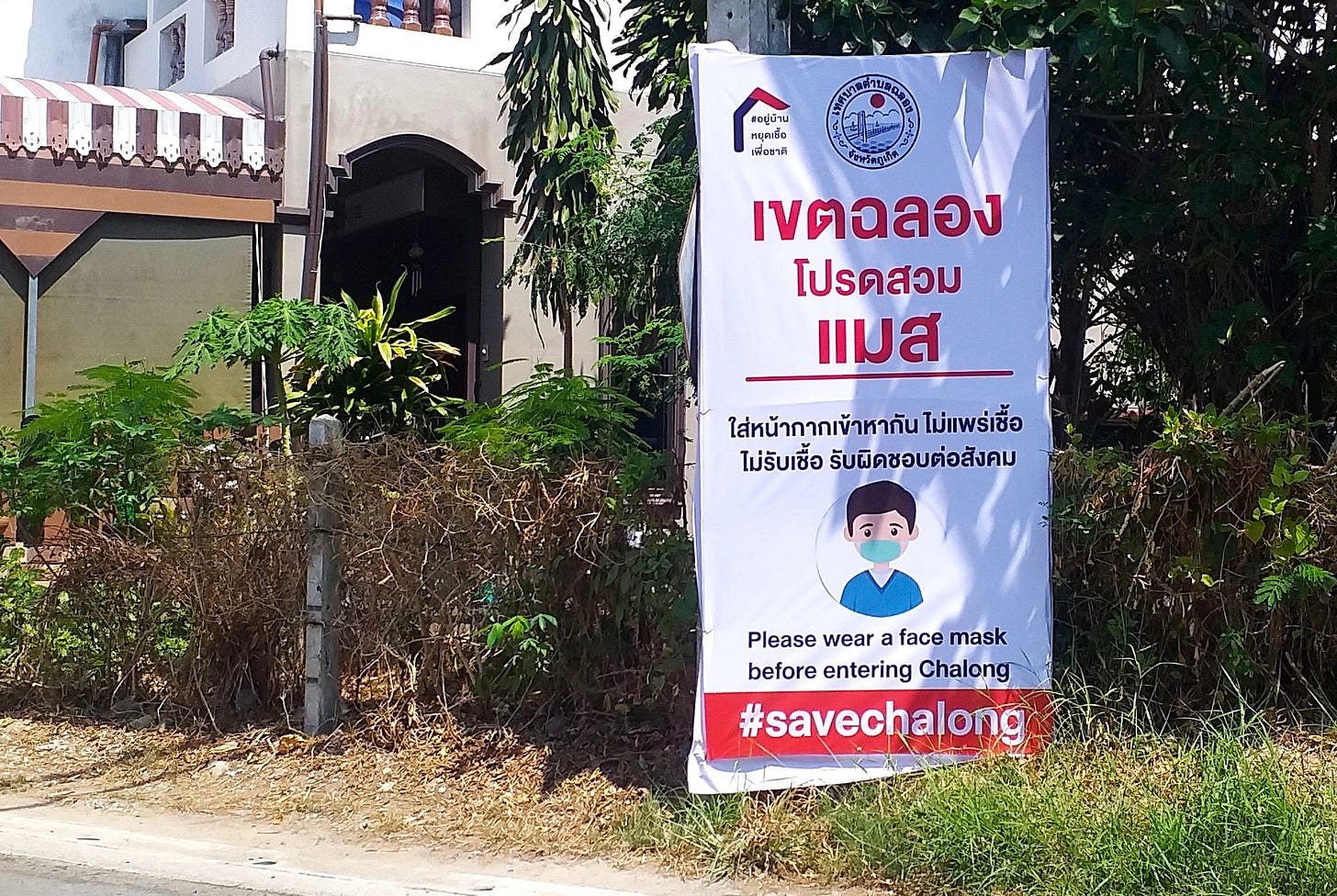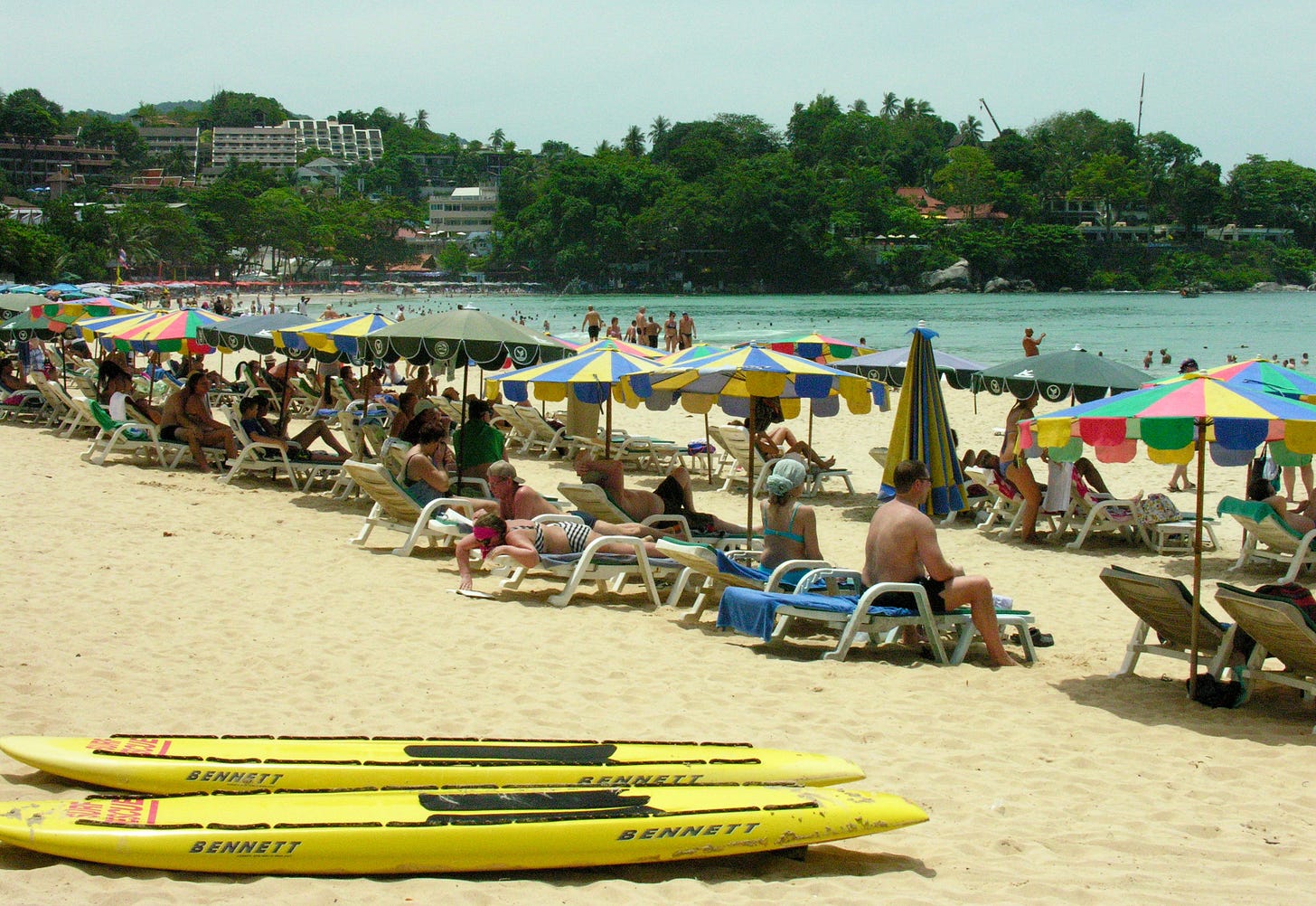Thailand prepares to drop quarantine for vaccinated inbound travelers to Phuket
New info is out on Thailand's plan to welcome vaccinated travelers from abroad, without quarantine, from July 1st. (Island Watch #7)
Update, June 5th: All info in this article remains accurate except that the proposed duration for the initial period of time spent on Phuket will likely be 14 days rather than seven, and more testing may be required. The final plan is expected to be approved by June 11th.
Believe it or not, Thai authorities are barreling ahead with the Phuket Sandbox plan that was first proposed before Covid-19 spread to all 77 provinces. According to a recent statement by the Tourism Authority of Thailand (TAT), starting July 1st, “there would be no quarantine for international visitors who must remain in Phuket for at least seven nights before traveling elsewhere.”
The government’s insistence on sticking to a July 1st deadline for allowing vaccinated travelers to skip quarantine comes as a surprise to many. Consider the backdrop.
Thailand is reporting thousands of Covid-19 cases per day, with bars and many tourist attractions closed nationwide. Phuket is one of many provinces that require proof of vaccination, a negative Covid-19 test or 14-day quarantine for travelers coming from Bangkok and other parts of Thailand with high case numbers. The country’s mass vaccination program isn’t expected to start until June 7th, and it appears that Phuket itself might fall short of the desired 70% inoculation rate by July 1st.
After shortening quarantine in March, Thailand currently requires all inbound travelers — including those who are vaccinated — to spend 14 days in a quarantine hotel. Inbound travel from certain countries, such as India, is banned altogether. Several nearby countries, including Malaysia and Vietnam, are grappling with their own outbreaks and vaccine shortages after more transmissible variants slipped over the borders. New variants are arising within the region.
Despite this worrying situation, Thai authorities appear resolved to use Phuket as a test subject in what amounts to a risky experiment. This article addresses what’s currently known and what remains unclear about the program. In a second article tomorrow, I’ll dig deeper into the remaining challenges and risks.
Status of the Phuket Sandbox
The program has not yet been officially approved by the Cabinet and the Center for Covid-19 Situation Administration (CCSA), a task force led by the Prime Minister that has final decision-making power. But unlike past statements about inbound tourism, the May 27th announcement was not simply an official thinking out loud. It stated that a committee chaired by the Prime Minister approved of the draft plan.
While there’s still time for backtracking, the CCSA and other agencies at the national and local levels are clearly focused on making the program a reality. Final approval and more details are anticipated during the second week of June, meaning that none of the rules have been finalized just yet. With that said, the draft plan and further statements by officials have provided new info that’s worth sharing.
Before departure
Adults entering Phuket from abroad will need to show proof of inoculation via any vaccine approved by the WHO and/or Thai FDA. Completed vaccination — the second of two shots unless it’s the Johnson & Johnson vaccine — must take place more than 14 days and less than one year before departure.
Exactly what qualifies as proof of vaccination has not been clarified, and Thai authorities may have to accept whatever certifications are available in source countries. This is a particular concern when it comes to travelers from the US, where there’s no nationwide vaccination registry and the “proof” is a piece of paper which is difficult to verify, easy to forge and varies from state to state.
The policy on children is unclear as well. The TAT governor told Phuket tourism operators yesterday that children aged six and under will be exempt from vaccination and testing requirements, while children aged seven to 18 will need to be vaccinated or test negative for Covid-19 no more than 72 hours before arrival.
It appears certain that vaccinated inbound travelers will need to show a negative result from a RT-PCR test administered in their countries of origin no more than 72 hours before departing for Thailand. I’ve seen no indication that they’ll need to be tested again upon arrival at Phuket Airport, but this could change.
Inbound travelers will need to obtain a Certificate of Entry (COE) via a relatively simple online process with a 72-hour turnaround through the Entry Thailand portal. Travelers will also need to show proof of insurance that would cover medical costs, including for Covid-19 treatment costing up to $100,000 USD. Both the COE and insurance requirements have been in effect since last year.
Other than those under the age of 18, any travelers who have not been vaccinated will need to pay for a 14-night stay in an Alternate Local State Quarantine (ALSQ) hotel, as is currently the case when entering Phuket from abroad. ASQ hotels will still be available in Bangkok as well. Until October 1st at the earliest, only vaccinated travelers entering Phuket will be able to skip quarantine.
The program is geared to foreign tourists, but Thai citizens and holders of other visa types are also expected to use it to bypass quarantine. For example, a resident of Bangkok who is currently outside of Thailand will probably be able fly to Phuket and spend a week there before heading home. Tourists will be able to enter using a tourist visa or a 30-day visa exemption if they’re from an eligible country.

Upon arrival
It first appeared that inbound travelers would need to arrive on a direct flight to Phuket Airport (HKT) from abroad. This is unresolved, but transiting to a Phuket-bound flight in Suvarnabhumi Airport (BKK) may be possible.
The problem is that travelers arriving in Bangkok on long-haul flights from abroad normally need to clear immigration and officially enter Thailand before heading to the domestic terminal in Suvarnabhumi Airport or traveling 35 km north to Don Mueang Airport (DMK) before catching their onwards flight to Phuket. Hopefully the authorities will devise a work around, but it could take a while. If you plan to enter Thailand in July, I suggest flying into Phuket rather than Bangkok.
If a “no transit in Bangkok” rule sticks through July or longer, there’s been no indication that the flight to Phuket must originate in country of origin. For example, a vaccinated American could take a flight to Dubai (among others) and then transfer to a direct flight from there to Phuket.
Travelers may need to show an itinerary for their trip upon arrival, though it’s unclear what needs to be included. It’s also unclear if tourists need to pre-book lodgings for the full duration of their stays in Thailand, or only for the mandatory first week spent on Phuket. Proof of lodgings for the whole trip was required for the soon-to-be-scrapped Special Tourist Visa that was launched last year.
Travelers will need to download the Thailand Plus smartphone app and agree to be tracked by GPS technology throughout their stay in Thailand, ostensibly to facilitate contact tracing in the event of an outbreak. The tracking procedure for travelers who don’t have smartphones remains unclear. They might be subjected to the GPS tracking wristband that was developed last year.
On Phuket and beyond
All inbound travelers will need to stay at lodgings with Safety and Health Administration Plus (SHA+) certification, meaning the properties have passed the government’s safety standard check and 70% of staff have been vaccinated. The vaccination requirement was announced in relation to SHA only recently, explaining why the “Plus” was added to the name.
As of yesterday, 440 lodgings in Phuket have SHA certification. Procedures for these and other types of businesses to upgrade to SHA+ are in the works.
Staying at a SHA+ property will be required for the first seven nights. This means that residents of Phuket who fly home from abroad will not be able to stay in their own homes until being cleared after day seven of the Sandbox program. For travelers who prefer to try out different lodgings, it appears that staying at more than one SHA+ property over the course of the first week will be permitted.
Travelers will most likely be free to go anywhere they want on Phuket while using their pre-approved room as a base. Visiting with locals and other tourists will also be allowed according to the current info. Officials might require travelers to only dine at restaurants, book activities and visit attractions that have SHA certification, but this will be difficult to enforce. Back-alley noodle shops of Phuket town will likely be open to inbound travelers just the same as any SHA-certified restaurants.
However, all travelers — except perhaps children under seven years old — will need to take a RT-PCR test on day five of their mandatory stay on Phuket. If they test positive, they will be transported to a hospital whether displaying symptoms or not.
If testing negative on day five, travelers will then be allowed to take day tours to other islands in Phuket province, such as Ko Hey and Ko Racha Yai. A TAT statement initially dictated that nearby islands which are part of other provinces — like Ko Phi Phi Don and Ko Yao Yai — will also be open to day tours for travelers who test negative on day five. This contradicts a separate rule that travelers must not enter any province other than Phuket until being cleared following day seven.
After that first week on Phuket, travelers will most likely be allowed to freely travel around Thailand and stay in any lodgings they choose. Contrary to misinformation that’s been floating around online, officials have not announced that travelers will face any subsequent testing or “check ins” after the first week.
No details have been announced regarding penalties for travelers who don’t follow the rules. I’m keen to know what might be in store for a traveler who, for example, spends a night at a friend’s house rather than their approved hotel room.
“Low to medium risk” travelers accepted
The Phuket Sandbox is not a “travel corridor” agreement between Thailand and certain other countries. Vaccinated travelers from all “low to medium risk” countries are expected to be eligible for the program.
A list of “high-risk” countries from where travelers will not be eligible has not yet been released. Thailand currently has an outright ban on arrivals from India, Pakistan, Bangladesh and Nepal. I expect these to join several African nations, including South Africa, on the list of ineligible countries. One grey area relates to passport holders of “high-risk” countries who reside in and fly to Phuket from a “low to medium risk” country. Whether they’ll be allowed entry is an open question.
Not being on the “high-risk” list does not mean that travelers from all other countries can easily visit Thailand starting July 1st. Australia and China are two major source markets that have restrictions on citizens traveling abroad for tourism. Potential tourists from countries that have strict quarantine rules regardless of vaccination status, such as New Zealand and Singapore, are unlikely to be inclined to visit Thailand due to mandatory isolation when returning home.
Also, the program’s vaccination prerequisite remains unattainable for many people. Two more of Thailand’s major source markets, Japan and Russia, have only inoculated around 5% and 10% of their populations, respectively. Vaccination rates are similarly low in most Southeast Asian countries, dashing hopes of attracting many tourists from countries like Malaysia, Indonesia and the Philippines.
So who’s left? Mostly the vaccinated and financially stable folks who live in parts of Europe and North America. As for whether they’ll come or not, check back here tomorrow for a look at who might take advantage of the program along with remaining risks related to vaccinations, variants and more. 🌴







Thank you for that great writeup
It will be late this year or early 2022 before I can fly over, so I'm interested to see how this concept plays out. If it does work, why wouldn't a vaccinated traveler choose to hang out in Phuket for a week rather than in a Bangkok ASQ for two weeks. It is still too early to tell; things could change dramatically between now and the end of the year. But this looks like a real option for me and for a few others I know looking to fly to Thailand in December or so. Thanks for the news and analysis, David. Cheers.